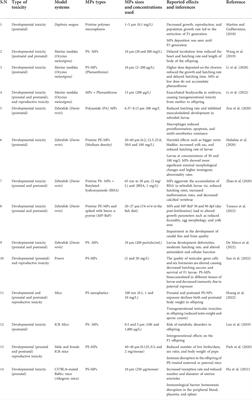REVIEW
Published on 31 Aug 2022
Developmental and reproductive toxic effects of exposure to microplastics: A review of associated signaling pathways

doi 10.3389/ftox.2022.901798
- 9,357 views
- 36 citations
3,900
Total downloads
18k
Total views and downloads
Select the journal/section where you want your idea to be submitted:
REVIEW
Published on 31 Aug 2022

MINI REVIEW
Published on 19 Aug 2022
OPINION
Published on 22 Jul 2022
REVIEW
Published on 15 Jun 2022

